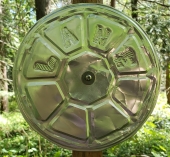posted 7 months ago
Most of the things I'd recommend have already been mentioned.
The only thing I'd add is to check the FAMACHA score (a fancy way of saying to look at the color of the lower shelf of the eye to see how much red blood cell density they have).
What I do when I suspect worms or an infection is:
1. Watch it to see if it continues.
2. Is it happening when my ram is around food. Rams seem especially bad around trying to wolf down hay or any supplement. Powdery supplements are especially bad for this.
3. Check their FAMACHA.
- if I expect an infection I'll also look over the animal for other signs.
4. Check and refill the loose minerals. (sheep mineral only, to avoid copper as RRanson mentioned)
5. Do a Fecal Float (or pay a vet, it's cheap)
- corollary, if you have a high-school ag program, 4-H, or FFA around, the members will usually be excited to do it for you. :)
If the levels are low, I don't worry about it and step up pasture rotation. If they're higher, I use targeted wormers. Depending on the parasite, I may treat in a targeted way or I may treat the whole flock regardless. For example, barberpole worm is nasty, and hard to get rid of. If I had evidence of it I'd start injecting everyone. Coccidia, same thing but just because it tends to spread quickly based on conditions. Some others it would be more targeted. Your vet can guide you when you tell them you're trying to avoid a *scorched earth* approach.
I tend to give a variety of foods for worms, many have been mentioned. I have no idea if they make a difference but I figure it doesn't hurt and they enjoy the treat.
(edit: correcting spelling)
"Draw your own conclusions, but draw them in pencil so you can change them again later."
-- Douglas Black






 2
2




 2
2











 3
3




 2
2











 2
2











 4
4




 2
2










